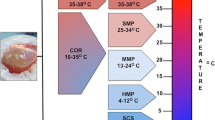Summary
Human liver transplantation is still hampered by lack of suitable donor organs. Many patients die on the waiting list. In addition, preservation and reperfusion injury are still acute problems in liver transplantation, especially with long preservation times. This article focuses on possible avenues to improve organ quality. Studies showed that rapid cooling of the liver during retrieval is important, thus resulting in low enzyme release upon reperfusion. Also, the effect of the hydrophilic bile salt tauroursodeoxycholate upon reperfusion injury was tested. It is shown that after pig liver transplantation, enzyme release and bile flow are improved, and the structural integrity of the biliary system is preserved. These results indicate that special treatment and pre-conditioning of the donor liver could lead to improved organ function and decreased numbers of organs with primary dysfunction or even nonfunction.
Zusammenfassung
Bei der Lebertransplantation ist der Mangel an Spenderorganen das letztendlich limitierende Problem, die vielen Patienten auf der Warteliste ausreichend zu versorgen. Hinzu kommt, dass die Präservations- und Reperfusionsschädigung der Spenderleber ein noch unzureichend gelöstes Problem bei der Lebertransplantation ist, v.a. wenn die Konservierungszeit über 12h hinausgeht. In diesem Artikel werden Ergebnisse einer möglichen Konditionierung der Spenderleber vorgestellt. Zum einen zeigt sich, dass eine optimale Kühlung der Organe während der Entnahme wichtig ist, zum anderen kann durch das in der inneren Medizin seit langem bekannte hydrophile Gallensalz Ursodeoxycholat eine Reperfusionsschädigung abgemildert werden: Die Enzymfreisetzung nach Reperfusion ist vermindert, zudem sind Gallenfluss und Gallensalzsekretionsrate signifikant gesteigert. Für die Klinik bedeuten diese Ergebnisse, dass durch eine gezielte Behandlung der Leber vor Entnahme eine Qualitätssteigerung erzielt werden kann, die in großen Kolleketiven auch zu einer signifikanten Senkung der Raten von initialer Funktionsstörung (primary dysfunction) und initialem Nichtfunktionieren (primary nonfunction) führen sollte. Große klinische Studien fehlen hierzu jedoch noch.
Similar content being viewed by others
Author information
Authors and Affiliations
Rights and permissions
About this article
Cite this article
Hertl, M., Hertl, M., Testa, G. et al. Präoperative Maßnahmen zur Organprotektion. Intensivmed 38, I71–I82 (2001). https://doi.org/10.1007/s003900170011
Issue Date:
DOI: https://doi.org/10.1007/s003900170011



